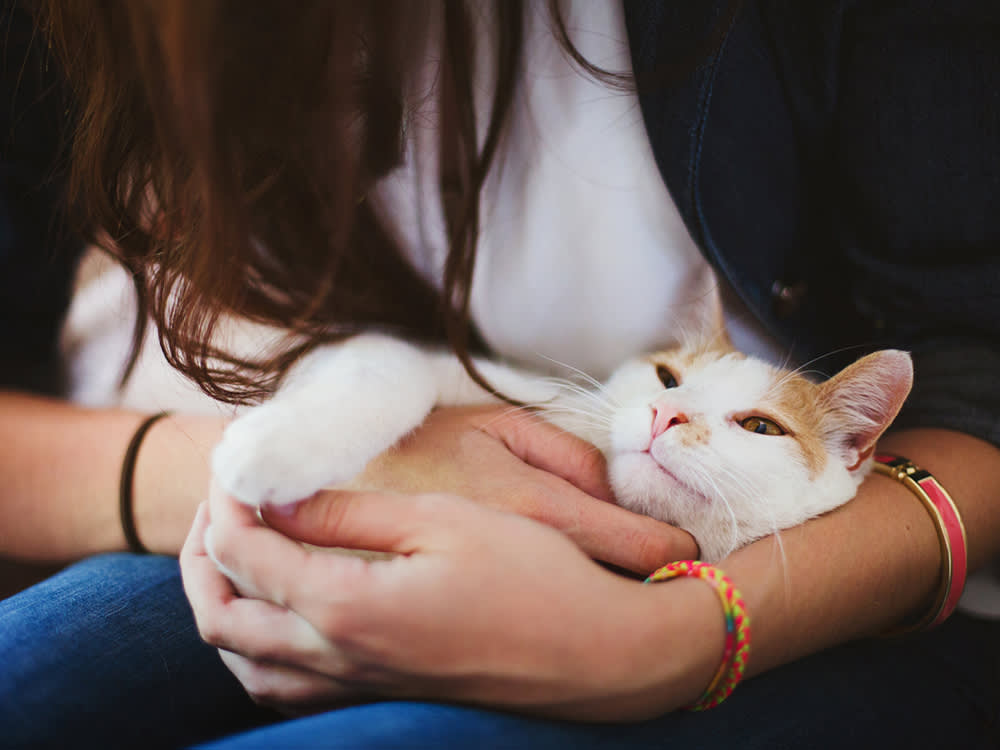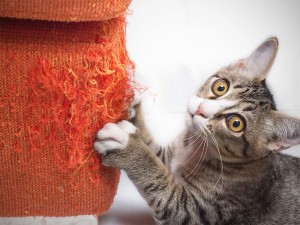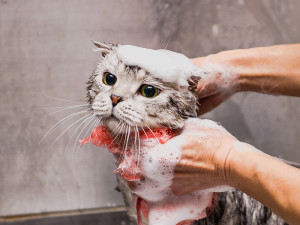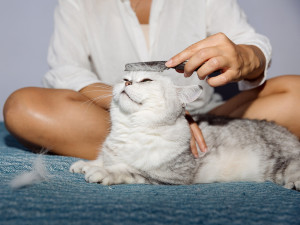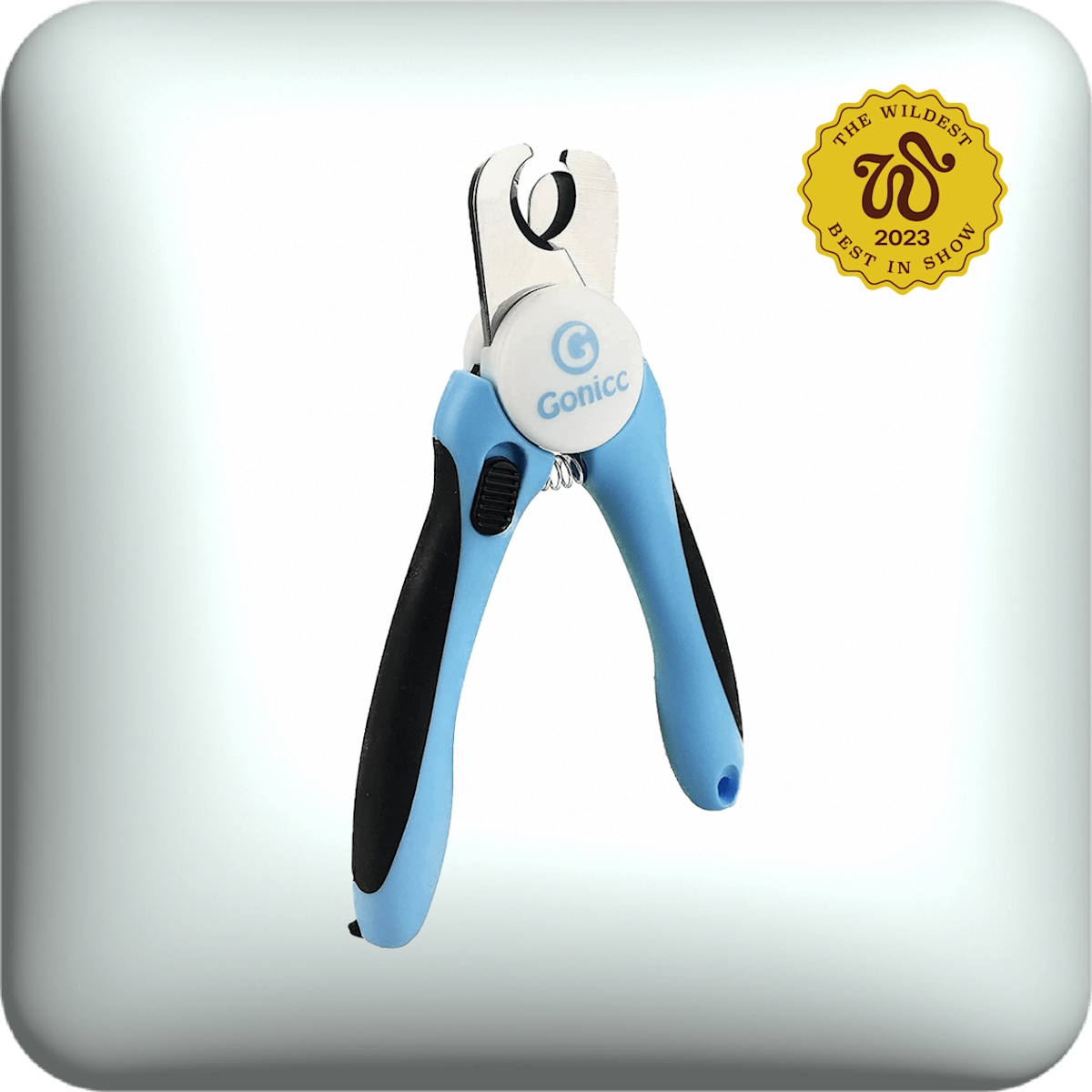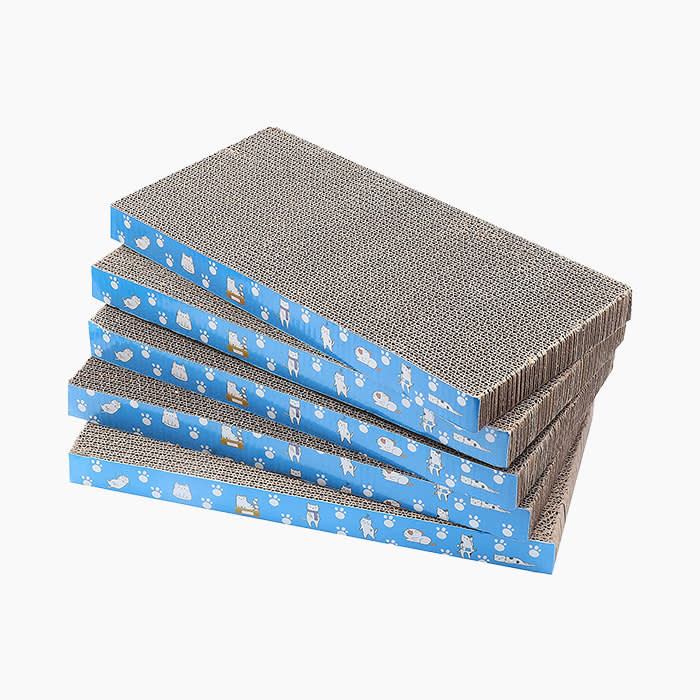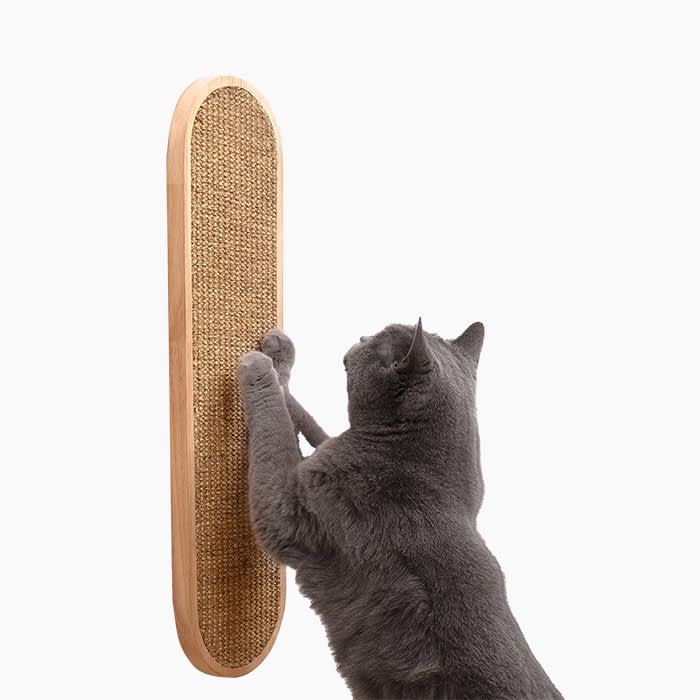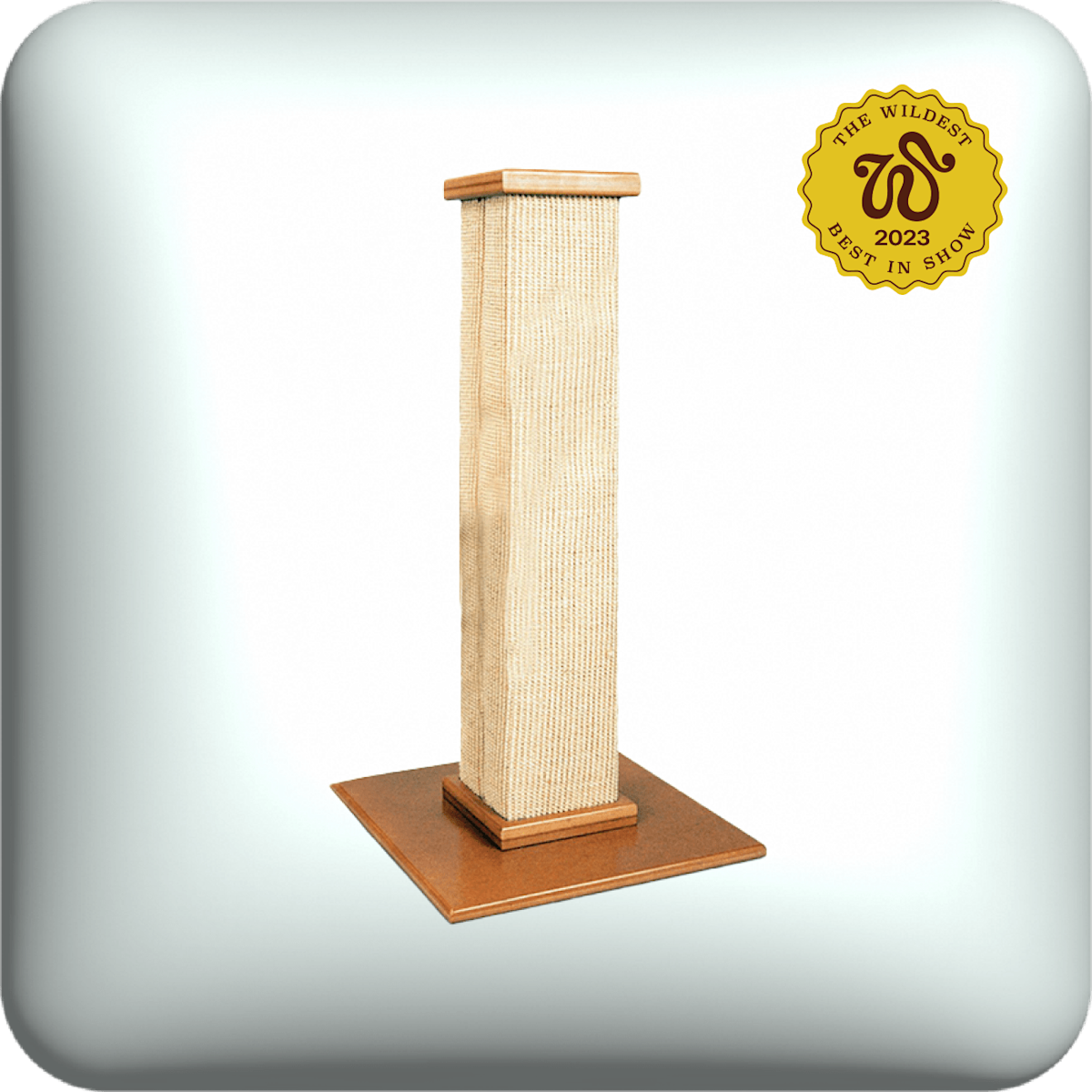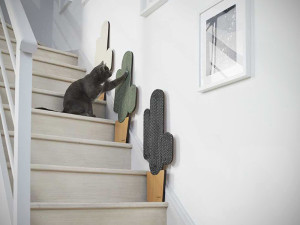New Research Aims to Reduce Cat Stress During Nail Trims
Plus, expert advice on how to trim your cat’s nails at home.
If you come toward your cat with some nail clippers, do they just take off? It's probably fair to say they are not the biggest fan of at-home spa time, especially when those sharp clippers come out. Good news: Researchers at the University of California, Davisopens in new tab, are working with the Sacramento SPCA to figure out a way to make nail clipping a little less stressful for everyone.
Jennifer Link, a Ph.D student in the UC Davis Animal Welfare Animal Lab, is developing a multistep protocol that she hopes will help calm cats who are getting their nails trimmed. She has worked with over 70 cats so far.
Save on the litter with color-changing tech that helps you better care for your cat.
Link's method involves letting cats lead the way. First, they are placed in a quiet room with her sitting behind a mat. “If a cat puts their front two paws on the mat, they are given pets and a treat. The cat is meant to learn that Link interacts with them only when they place their paws on the mat,” UC Davis reported. Link then touches the cat’s legs and paws before gently squeezes the cat’s paws. If the cat resists or stops interacting, Link stops the process — if not, she clips one nail. “I think with the cooperative care, it does seem to almost improve their trust in me,” Link told UC Davis.
Link is hoping for her method to be taught to volunteers in shelters to help reduce stress in cats, but researchers still need to analyze her work. If they find that the protocol is successful, they will share it with other shelters to gather more data.
In the meantime, there are plenty of ways to get through a stress-free nail trimming with your pet at home — and, you guessed it, you’ll definitely want to take it at your cat’s pace. Below is everything you need to know before you grab those nail clippers.
Why is trimming my cat’s nails important?
There are many reasons why nail trimming for cats is important as a pet parent. Often, it depends on whether you have an indoor or outdoor cat and your cat’s health condition:
Indoor and outdoor cats need to have their nails trimmed because they can snag on surfaces and get caught. It’s also possible that your cat might lose their ability to retract their claws.
As an outdoor cat ages, they may be less active so their nails grow out, increasing their risk of the nails growing into a curve. If the nails start driving into their footpads, it may cause pain or infections. So, it’s important to trim their nails.
If your cat is arthritic, they may not exercise enough to keep their nails short enough.
How often should I trim my cat’s nails?
Wondering how often you should actually trim your cat’s nails? Generally, cats claws need to be trimmed every two to three weeks, as part of maintaining their overall health. This will protect you (and your family) from getting scratched and will prevent your furniture and other belongings from getting torn apart.
What tools do I need for trimming my cat’s nails?
There are a few different types of tools you can use to trim your cat’s nails. Here’s what to consider for your cat trimming tool kit:
The most important tool you need is a claw clipper: Choose a well-sharpened pair with a scissor cut, safety lock and nail guard — this will ensure that you only cut the white parts of your cat’s nails and not the pink part, which contains blood vessels.
There are other types of clippers that use “pliers” or a sliding “guillotine” blade to cut cat’s nails — find a pair that works best for your and your cat. Make sure whatever you use is what you’re both most comfortable with.
Some cat parents prefer grinders, which slowly file down claws gently.
You probably also want to pick up a styptic pencil or powder — these are anticoagulants that you can apply to your cats paws if you accidentally cut the quick of their nails, to stop the bleeding.
How do I prepare my cat for a nail trim?
Although it may not seem like there’s an easy way to cut your cat’s nails, we asked Marilyn Krieger, certified cat behaviorist at The Cat Coachopens in new tab, and Dr. Lori M. Teller, a veterinarian and professor at Texas A&M University’s College of Veterinary Medicine and Biomedical Sciences, to share some pro tips. Krieger suggests preparing your cat for a claw-trimming session a few weeks in advance by regularly touching their paws.
“You can touch the paw pads and individual toes until your cat is comfortable with you handling their feet,” she says. “You work up to [the actual trim] by making the handling of your cat’s paws as positive and stress-free as possible.” Dr. Teller adds that it’s important for your cat to get used to the sight, sound, and smell of the clippers. “Leave them out for your cat to examine while they wander around the house, and place a treat atop the clippers so your cat associates them with something positive,” she says. “Then, when your cat is sitting comfortably in your lap, clip a piece of dried spaghetti, which mimics the sound of a claw being trimmed.”
What is the proper technique for trimming cat nails?
Figuring out how to trim your cats nails or cut your kittens nails can seem daunting. But it doesn’t have to. Follow these easy steps.
1. Start when your cat is a kitten, if you can.
Turns out, with proper conditioning, motivation, and patience, even scrappy cats can learn to tolerate a session of claw-clipping. “Ideally, you should start trimming your cat’s claws when they are a young kitten and more open to new experiences,” Dr. Teller says. “Mine are fine with it because of how I’ve trained them,” Krieger adds. “The trick is to make it a positive thing and not stress them out.” But both experts agree that even senior cats can learn to sit still for a trim.
2. Pick the right moment to make the cut.
This is important: When it’s time to cut your cats nails, reintroduce the clippers when your cat is in a mellow mood. “A good time is when your cat is relaxed and maybe sleepy,” Krieger recommends. She suggests that a good time would be after eating a meal or snacking on catnip. Needless to say, don’t attempt this when your cat is feeling frisky or doing the zoomies. Hold your cat’s paw and gently press the pad to make the claw pop out. Just like pulling off calligraphy nail art, this requires a steady hand. FURMinator Nail Clippersopens in new tab’ non-slip ergonomic handle can help with that.
3. Try, try again — or trust a pro to do it properly.
Don’t stress. If clipping your cat’s claws is becoming a traumatic experience, another option is filing them down with a nail grinder, such as the Dremel 7300-PTopens in new tab. Why didn’t you say so earlier? The noise and vibration from a grinder may take even more getting used to. “The first few times you trim [or file] your cat’s nails, you may only get to do a few nails before your cat has had enough. And that’s okay; try a few more the next day,” Dr. Teller adds. You want to make sure your cat is calm to cut their nails: “The process should be slow and gradual. You have to keep reminding yourself, I’m on cat time.”
That said, if this is no spa day for either of you, invest in a cat scratching post to do the heavy lift. You can also get your cat’s nails clipped elsewhere: Go to your veterinarian or a professional groomer for upkeep.
What should I do if I accidentally cut into the quick?
No one wants to see their cat’s nails bleeding, but accidents happen: Try your best to trim off the white, pointy tip but be careful not to cut the pink area at the base of the claw — that’s the ‘quick’ and it contains blood vessels and nerves. “You have to be so careful — cats can squirm and cause accidents,” Krieger cautions. If you accidentally nip it, dip your cat’s toe into Miracle Care Kwik Stop Syptic Powderopens in new tab, which will stop the bleeding and ease the pain.
FAQ (People Also Ask):
1) What if my cat gets anxious during nail trimming?
If your cat gets anxious, create a positive association with the nail trimmers by putting them next to their food bowl, and rewarding your cat with a treat after you clip each nail.
2) Are there alternatives to trimming my cat’s nails?
You can apply nail caps to your cat’s nails — they will act as a protective shield so you don’t have to trim their nails as often. You can also invest in scratching posts.
3) Should I consider professional grooming for my cat’s nails?
If you or your cat is uncomfortable with trimming nails at home, you can take them to a professional groomer to do it for you.
Best Cat Nail Trimming Tools
Btw, our editors (and their pets) picked out these products. They’re always in stock at the time we publish, but there’s a chance they’ll sell out. If you do buy through our links, we could get a kickback. (We’ve got a lot of toys to buy over here, you know?)
